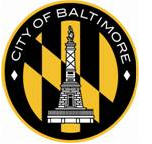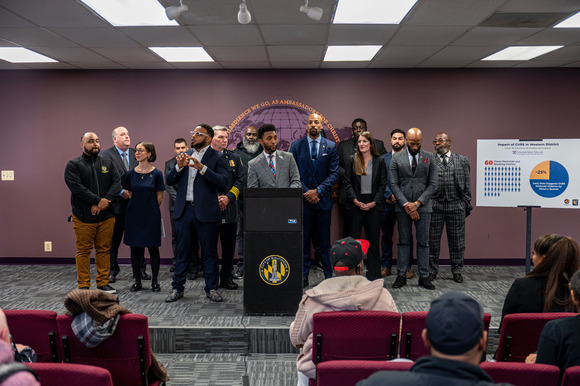Baltimore City Outlines Next Steps for Group Violence Reduction Strategy (GVRS) Expansion
Thursday Feb 8th, 2024

FOR IMMEDIATE RELEASE
Researchers at University of Pennsylvania Announce Preliminary Study Findings Showing GVRS Is Associated With Significant Reductions in Group Violence

BALTIMORE, MD (Thursday, February 8, 2024) — Today, Mayor Brandon M. Scott was joined by MONSE Director Stefanie Mavronis, Baltimore Police Commissioner Richard Worley, Deputy State’s Attorney Thomas M. Donnelly, Dr. Aaron Chalfin, Associate Professor of Criminology, University of Pennsylvania, representatives from YAP and Roca, Inc., and community leaders to highlight the role of the City’s Group Violence Reduction Strategy, including the recent expansion into the Central District. At the event, the external monitoring team from the University of Pennsylvania’s Crime and Justice Policy Lab released their preliminary findings of an 18-month study of GVRS work in the Western District, which shows the strategy to be effective in driving down violence.
The implementation of the focused deterrence strategy in the Central District in January 2024 marks a significant expansion of the GVRS. Mayor Scott and his public safety officials also outlined plans for expanding GVRS to additional districts by the end of the calendar year, starting with the Eastern District by the end of Q1 / beginning of Q2 2024. GVRS was first piloted in BPD’s Western District in January 2022 before it was expanded to the Southwestern District in January 2023. The preparation for expansion to the Eastern District is already underway.
“GVRS has played a critically important role in driving the largest year-over-year homicide reduction in Baltimore’s history in 2023, and is showcasing that our comprehensive approach to reducing gun violence is working” said Mayor Brandon M. Scott. “Focused deterrence has failed in two previous attempts in Baltimore because the necessary commitment from city leaders, resources for implementation, and services for participants working to step away from a life of violence weren’t available. Every metric we have is showing that this strategy is working. Now is the time to keep up the momentum so that we can continue making our neighborhoods safer for everyone in the right way.”
“This is the power of implementing a strategy that doesn’t solely rely on law enforcement. We are interrupting cycles of violence and proving that when people, their families, and communities are given support that’s responsive to their needs — including life coaching, behavioral health services, housing support, and case management — they will often make the choice to step away from the life,” said MONSE Director Stefanie Mavronis. “GVRS is, and has always been, a citywide strategy. Now that we’ve begun the operations-wide shifts and expanded to the Central District, we have the platform we need to expand this work throughout the city.”
At Thursday’s event, the external evaluation team at the University of Pennsylvania’s Crime and Justice Policy Lab (CJP) talked extensively about the preliminary assessments of the impact of the Group Violence Reduction Strategy (GVRS) in the Baltimore Police Department’s Western District – the area with historically the highest rates of homicides and shootings in Baltimore, and among the highest in the United States. The UPenn team found that, in the 18 months after its introduction in January 2022, GVRS was responsible for reducing homicides and shootings in the Western District by roughly a quarter, and carjackings by about a third, with no evidence that these crimes moved to other parts of the city. A summary of evaluation findings can be found on MONSE’s website.
“From a policy perspective, this evaluation’s early findings do three things: (1) they underscore the potential of GVRS to reduce gun violence, while avoiding the collateral consequences of mass arrests; (2) they also demonstrate the power of targeted interventions, like GVRS, that focus on the small number of individuals and groups at the very highest risk of involvement in gun violence; and, finally, (3) they make a strong case for continued investment in bringing GVRS to scale in Baltimore City,” said Dr. Anthony Braga, Director of the University of Pennsylvania’s Crime and Justice Policy Lab.
Between implementation in January 2022 and February 5, 2024, 140 individuals at the highest risk of being involved in violence have received life-changing services through YAP and Roca as part of the strategy in the Western and Southwestern BPD Districts. GVRS participants have only a 4.3% recidivism rate and a 5% revictimization rate for those enrolled in services, which provides significant evidence that those engaged by the program are finding success in stepping away from violence and being provided the necessary resources to ensure those life-changes are sustainable.
“YAP's GVRS work is guided by the principles behind our organization’s youth and family wraparound services model, which we began using nearly 50 years ago as a community-based alternative to youth incarceration. This wraparound services approach is also effective when empowering individuals at the highest risk of engaging in violence with individualized tools to turn their lives around” said Youth Advocate Programs (YAP), Inc. Regional Director Craig Jernigan. “YAP staff members, who share experiences and backgrounds with those they serve, are trained to help program participants see and nurture their strengths, put their lives on a positive course, and give back to their communities.”
“Roca is honored to have the privilege of serving the young people of Baltimore in partnership with the Mayor’s Office of Neighborhood Safety & Engagement, the Baltimore Police Department and so many dedicated partners within the Group Violence Reduction Strategy,” said Kurtis Palermo, Executive Vice President, Roca Maryland.
A key component of the GVRS strategy is holding accountable those individuals who make the decision to continue to be involved in group violence even after being identified as belonging to a violent social network that data shows makes them imminently a potential victim or perpetrator of violence. Since implementation, law enforcement partners have made 223 arrests directly tied to group violence as part of the strategy, including 148 arrests directly through BPD’s Group Violence Unit (GVU).
“BPD is a proud partner in GVRS as we work to reduce gun violence and make our city safer,” said Commissioner Richard Worley. “Since the beginning of 2022, BPD has arrested more than 220 violent crime drivers associated with group violence and dismantled several drug trafficking and violent organizations, all of which are directly tied to strategy. These enforcement efforts, in addition to services provided to individuals, have significantly contributed to our shared goal of reducing homicides and shootings in Baltimore.”
The strategy relies on strong partnerships between MONSE, BPD, the State’s Attorney’s Office, the Maryland Attorney General’s Office, service providers YAP and Roca, and Baltimoreans who leverage their credibility within their own neighborhoods to let high-risk individuals know that their behavior has to change and support them in exiting cycles of violence.
To ensure quality implementation of GVRS across districts, the Scott Administration and technical advisors are measuring minimum capacity benchmarks for each of the Strategy’s four main components: shooting reviews, direct communications, intensive life coaching, and strategic enforcement.